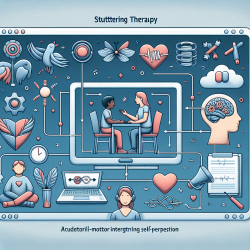As a practitioner working with individuals who stutter, it's crucial to stay informed about the latest research to provide the best care. The recent study titled The Relationship Between Auditory-Motor Integration, Interoceptive Awareness, and Self-Reported Stuttering Severity offers valuable insights that can enhance your therapeutic approach.
Key Findings
The study highlights two primary factors influencing stuttering severity:
- Auditory-Motor Integration: This refers to the ability to synchronize speech with external auditory cues. The study found that individuals with lower synchronization abilities perceived their stuttering as more severe.
- Interoceptive Awareness: This involves awareness of internal body sensations, such as heartbeat and physical discomfort. Higher interoceptive awareness was associated with a lower perceived impact of stuttering on daily life.
Implications for Therapy
These findings suggest that addressing both auditory-motor integration and interoceptive awareness can be beneficial in stuttering therapy. Here are some practical steps you can take:
- Incorporate Auditory-Motor Integration Exercises: Activities like synchronized speaking or rhythmic tapping can help improve synchronization abilities. Consider using metronomes or other rhythmic cues during therapy sessions.
- Enhance Interoceptive Awareness: Mindfulness exercises that focus on body sensations can help clients become more aware of their internal states. Techniques like deep breathing and body scanning can be integrated into your sessions.
- Remote Assessments: Utilize online tools like the Spontaneous Synchronization to Speech (SSS) test to measure synchronization abilities and the Multidimensional Assessment of Interoceptive Awareness (MAIA-2) for interoceptive awareness. These tools can provide valuable data to tailor your therapy approaches.
Encouraging Further Research
While the study provides significant insights, it also opens the door for further research. Encourage your colleagues and students to explore these areas to better understand the complex nature of stuttering.
To read the original research paper, please follow this link: The Relationship Between Auditory-Motor Integration, Interoceptive Awareness, and Self-Reported Stuttering Severity.










